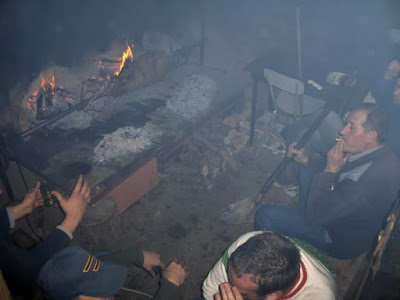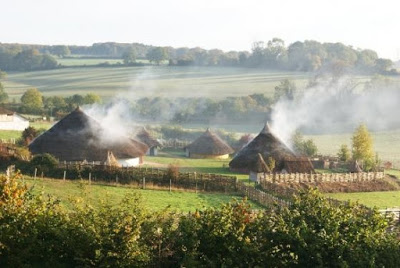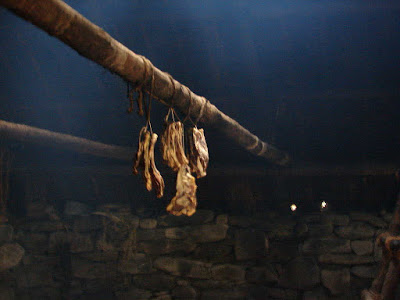#FolkloreThursday Thread: Serbian/Croatian proverb: "Who doesn't get smoked, doesn't get warm". The proverb simply states the fact that from the moment people started using fires inside roofed dwellings, the inside of these dwellings looked, pretty much permanently, like this:
The smoke created by burning of wood or peat inside of the hearth or the oven in the old, pre chimney, houses had no other way of escaping except through the pores and openings in the roof or through the door.
If for instance you approached an Iron Age roundhouse village, or any other village with pre chimney thatched roof houses, you would have seen something like this. The houses looking like they are on fire...
During the winter, I would guess, the house doors were shut, so even more smoke gathered inside of the house and slowly drifted upwards towards the roof. And up there, under the roof, on the supporting beams, people hang fish, meat and skins...
Why? Well in the same way the smoke killed bacteria and molds in the thatch, it did the same with the bacteria and moulds in meat turning it into smoked meat. Cured meat. And turning skins into cured skins. Leather...
So it turns out that, probably by chance, people realized that smoking meat and skins preserves them, protects them from rotting. No wonder then that smoke has been used to preserve and flavour food and treat leather since a very long time ago.
How long time ago is long time ago? No one knows really, but I would venture to say that the intentional use of smoking for preserving food and skin was probably already used in late Paleolithic, early Mesolithic period of human history.
And here is where we come to linguistics. In English, the word for preserving meat and skin using smoking is "curing". This comes from Latin word meaning "to care" and which has no obvious etymology...Where does this word come from?
The original meaning of the verb "to care" was "to care for", basically "to keep alive", "to preserve". We take care of someone or something that is dear to us, precious to us, and which is not able to take care of itself, like a child, a sick or wounded person, a young animal.
So what does "caring for" something or someone involve? Well basically it means keeping this something or someone dry, warm, feeding it, cleaning it, sheltering it from wind and rain, protecting it, making sure that nothing bad is done to it...
...and that it doesn't do anything bad to itself and its surrounding (like wreck the place if what you care for are children or young animals). Basically "caring for" means keeping alive.
The "caring for" something or someone is a full time job and requires staying in and around the shelter, house all the time. And this is why the "caring for" was always the job of women. They "cared for" children, sick and wounded and young animals.
Men "took care of" jobs that needed to be done, flocks, crops, land, and later towns, states...but with male duties the original meaning of "care for" was gradually lost and was turned into passive "worry" or active "manage"...
And this is what we are left with today pretty much. We "care" for so many things, we even occasionally "take care of" a thing or two, but we rarely "care for" anyone or anything.
Anyway, in the past, apart from caring for children, sick and wounded and young animals, women cared for another very important thing: fire. Fire in the house hearth was one of the most precious things which had to be constantly cared for, and never ever be allowed to die.
This behaviour has been recorded by ethnographers everywhere in Evroasia even in the 20th century, and it comes to us straight from the Paleolithic, and maybe even Mesolithic times, when people didn't know how to make fire.
Fire had to be found, a natural fire from a thunder strike or a forest fire, and then carefully preserved by caring for it. The caring for fire was so important that it was elevated to a level of a religious duty.
Every household would care for their own house fire, but temples would would also care for the village or town fire which also should never have been allowed to die.
Even after people discovered reliable ways of making fire, this belief in sacredness of fire and caring for fire remained in beliefs related to heath fire.
So how do you care for fire? Well in exactly the same way you care for children, sick and wounded and the young animals. Basically caring for fire means keeping fire dry, warm, feeding it wood, cleaning it from ash, sheltering it from wind and rain, protecting it...
You also have to make sure that nothing bad is done to it and that it doesn't do anything bad to itself and its surrounding (like burn the place down). The most important part of caring for fire is feeding it wood, basically keeping the fire alive, keeping it burning.
Anyway the rest is about the Slavic word "kur" to burn to smoke and whether it has anything to do with original root of the word to cure (to care, to preserve by smoke)... https://oldeuropeanculture.blogspot.com/2016/05/curing-smoking.html

 Read on Twitter
Read on Twitter





